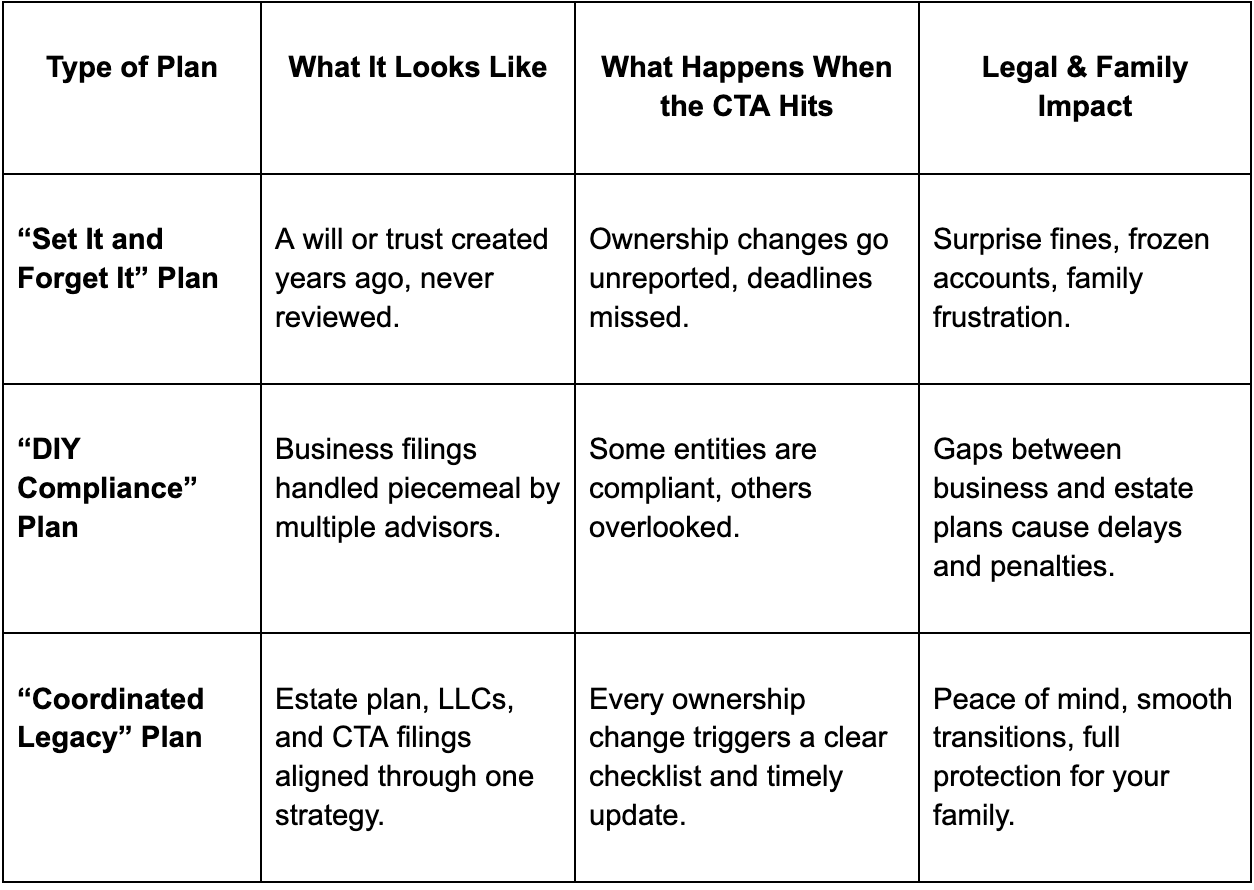Date:
November 3, 2025
Author:
Anastasia Fainberg
/
Founder & Managing Partner
How New Federal Reporting Rules Could Undermine Your Estate Plan
Setting the Stakes
You built your business carefully, formed an LLC, maybe placed it inside a trust, paid attention to taxes, insurance, and succession. You did everything right to keep your family protected. But beginning January 1, 2024, the federal Corporate Transparency Act (CTA) changed what “protected” means.
This new law requires nearly every small business in Colorado to report who really owns or controls the company, known as Beneficial Ownership Information (BOI), to the U.S. Treasury. Miss a filing or forget to update it? The penalty is $500 per day, and willful violations can carry criminal fines up to $10,000 or two years in prison.
And here’s the surprise: your estate plan doesn’t shield you from these obligations. In fact, many common estate planning events, funding a trust, updating a power of attorney, or transferring ownership after death, can trigger CTA filings within 30 days.
This blog walks you through what Colorado business owners need to know,and how to make sure your estate plan keeps you in compliance.

Why Every Colorado Business Owner Needs to Pay Attention
The CTA was designed to fight financial crimes like money laundering, but its reach is broad. Nearly all privately held LLCs and corporations must now report ownership data.
In Colorado, this means:
- Family-owned businesses - From Denver bakeries to contracting firms.
- Real estate holding companies - Many families use LLCs to hold rentals or vacation homes.
- Professional or gig entities - Even single-member LLCs for consultants, therapists, or Uber drivers.
There are exemptions, but they’re narrow. To qualify, a business must:
- Have 20+ employees,
- Generate $5 million+ in annual revenue, and
- Maintain a physical U.S. office.
Most Colorado families and small businesses don’t meet those thresholds.
What must be reported:
- Legal names of all beneficial owners.
- Dates of birth.
- Current residential addresses.
- A valid photo ID number (license or passport).
And it’s not a one-time task. Every time ownership or control changes, the business has 30 days to file an update.

Where Estate Planning and Compliance Collide
Estate planning is meant to protect what you’ve built, avoid probate, minimize taxes, keep family matters private. But under the CTA, the same events that make an estate plan successful can accidentally create compliance headaches.
Common trigger events:
- An owner dies. The successor trustee or executor now controls the company, requiring a new BOI filing.
- An LLC is transferred into a trust. Trustees and certain beneficiaries may count as “beneficial owners.”
- A power of attorney takes effect. That agent now exercises “substantial control” and may need to be reported.
- Business interests are gifted to children. Each transfer alters the ownership profile and must be updated.
If these filings are missed, fines accrue daily, and what began as a thoughtful succession plan can unravel fast.
Case Study: Mark and the Mountain Rental
Case Study: Mark (Breckenridge Rental LLC)
Mark and his wife owned a Breckenridge cabin through an LLC. Their estate plan moved that LLC interest into a revocable trust, so the property could pass to their kids smoothly.
But no one realized that the transfer triggered a CTA update. Months later, while refinancing, the bank requested proof of compliance. The BOI still listed Mark, who had passed away. The account froze until the report was corrected, delaying distributions and piling stress on the family. The fix was simple, but only after costly confusion.
The Real-World Consequences
Failing to report isn’t just a paperwork issue. The penalties hit both financially and emotionally.
The Risks:
- Civil fines: $500 per day of non-compliance.
- Criminal exposure: Up to $10,000 and two years in prison for willful violations.
- Frozen business accounts: Banks now require BOI proof before transactions.
- Delays in trust administration: Probate and estate settlements stall when ownership records don’t match federal filings.
For families already coping with loss, those added complications can turn grief into crisis.
Three Key CTA Triggers for Colorado Business Owners
1. Ownership Transfers into Trusts
Colorado families often fund revocable trusts to avoid probate, a smart move. But once an LLC membership is held by the trust, the trustee (and sometimes beneficiaries) become reportable beneficial owners.
Whenever you transfer business interests into a trust, file a new BOI listing the trustee and anyone exercising control.
Pro Tip: Coordinate trust funding with your attorney and CPA the same week the transfer happens, before the 30-day clock starts.
2. Death or Incapacity
Estate plans are built to handle life’s two biggest disruptions, but under the CTA, both create new reporting duties.
- If you die, your successor trustee or executor steps in → they must be reported.
- If you become incapacitated, your agent under power of attorney may qualify as a beneficial owner.
Without timely filings, families face penalties while trying to manage medical and financial emergencies.
Learn more about incapacity planning here
3. Succession and Gifting Events
Even positive transitions, selling shares to children, bringing on a new manager, or restructuring ownership, change who “controls” the business. Each shift requires an updated BOI within 30 days.
What feels like a private family decision is now a federal obligation.
The Corporate Transparenct Act Checkpoint: Is Your Plan Built for the New Rules?
Think of your estate and business plan like a vehicle inspection, every part must work together to keep the whole system safe. The CTA is the newest checkpoint on that route.

Common Misconceptions
Myth #1: “My trust protects me from the CTA.”
Reality: Trusts don’t create a CTA exemption. They often trigger a filing when used to hold business interests.
Myth #2: “Only big companies have to report.”
Reality: If you formed an LLC or corporation in Colorado, and it’s not publicly traded or a large operating company, you’re likely covered.
Myth #3: “My CPA handles this.”
Reality: Accountants may help with tax filings, but CTA compliance is a legal reporting duty. Responsibility falls on the business owner.
Why This Really Matters
The CTA is more than a government form, it’s a reminder that your legacy lives in the details. Your business, your trust, your family, all connected. If those pieces don’t communicate, the plan you built to protect them can create exactly what you hoped to prevent: confusion, penalties, and court involvement.
At Legacy Law Group Colorado, we’ve seen how small oversights ripple through generations. Updating your plan for the CTA isn’t about bureaucracy, it’s about preserving your family’s stability.
Planning well means your loved ones inherit clarity, not compliance notices.
How to Get Started
- Review your business entities.
Confirm which LLCs or corporations you control or co-own. - Check your filings.
Verify that each entity submitted its Beneficial Ownership Information (BOI) to FinCEN. - Identify trigger events.
Any trust transfers, deaths, new managers, or powers of attorney since 2024? Those require updates. - Align with your estate plan.
Make sure your trustee or successor agent understands the CTA reporting timeline. - Document instructions.
Leave a simple checklist for your family inside your estate binder: who to contact, what to file, and where to find entity records.
FAQs
Do all Colorado LLCs need to file a BOI report?
Yes, unless they meet specific large-company or inactive-entity exemptions. Most small and mid-sized LLCs must file.
When is the first report due?
Existing entities formed before January 1, 2024 have until January 1, 2025. New entities must file within 90 days of formation.
Who is a “beneficial owner”?
Anyone with 25%+ ownership interest or “substantial control,” which can include trustees and agents under POA.
If I change my trustee or manager, how long do I have to update?
30 days from the effective date of the change.
What if I don’t comply?
Civil penalties accrue daily ($500/day), and willful violations can result in criminal charges.
Can I delegate this to my CPA or registered agent?
You can authorize them to submit the form, but you remain legally responsible for accuracy and timeliness.
How does this affect trusts with multiple beneficiaries?
Typically, only those with “substantial control” or the right to withdraw assets are reported, but each trust must be analyzed individually.
Does Colorado have its own CTA-type law?
Not yet, but state agencies may cross-reference FinCEN data in the future for business registration accuracy.
Will this information be public?
No, the database is confidential and accessible only to law enforcement and certain financial institutions.
Closing Reflection
Estate planning has always been about protecting the people you love. Now, it’s also about protecting them from federal penalties they didn’t see coming. The Corporate Transparency Act adds one more layer to responsible ownership, and when handled correctly, it strengthens your plan instead of complicating it.
At Legacy Law Group Colorado, we help families connect their estate plans and business structures so nothing slips through the cracks.
Don’t leave your family’s future to chance, or to federal fines. Schedule your complimentary consultation today and ensure your business and estate plan are fully aligned for 2025 and beyond.






































